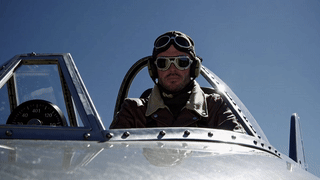Howard Hughes had a dark affinity for late-night flights over Hollywood, a luxury that today seems mundane, as common as drones circling the night sky. But try buzzing your private plane over Hollywood now, and you’ll find yourself swiftly escorted down—or worse.
Hughes gambled his life repeatedly on his passion for aviation. Obsessed with speed, he eventually almost died chasing a world record, likely driven by the tormenting notion that it was either risk it all or drown slowly in self-doubt.

Breaking record flying across the world.
He was notably eccentric—an outsider whose brilliance was tangled with madness. Audrey Hepburn recognized their similarity, cautioning him that their sharp edges made them vulnerable to the press’s voracious appetite for scandal. Hughes assured her confidently, “They can’t get into here. We are safe.” Audrey knew better, whispering hauntingly, “They can always get in.”
Howard was painfully aware of his deteriorating mental state. He likened his spiraling sanity to “flying blind,” acknowledging his own descent into darkness, yet unable to change course.
Obsessively guarded, Hughes’s paranoia was extreme enough to deny even a disabled man a towel in a public washroom. Isolation became his armor against a world he increasingly distrusted.
As a staunch capitalist, Howard despised socialists, and his introduction to Audrey Hepburn’s family turned into an icy clash of ideologies. The Hepburns, confident in their socialist beliefs, casually mentioned class struggles and money. Howard coldly retorted to their claim of not caring about wealth, “That’s because you already have it.” The family sat stunned, faced bluntly with their hypocrisy.
Though drawn to Audrey’s allure, Hughes gradually sensed her duality—warm and alluring with him, controlled and distant among her socialist kin. Still, desire clouded his judgment, and he pressed on with the relationship despite mounting tension.
A fierce advocate for free speech in an era of tight censorship, Hughes defiantly produced films deemed “morally corrupt,” openly challenging the oppressive grip of religious and moral authorities. It was an act of cultural rebellion during a time when even religious freedoms were precariously fragile.
In one tense scene, the socialist Audrey commanded Hughes not to answer the ringing phone—a symbol of control and dominance. Defiant, Hughes picked up, effectively ending their fragile relationship. The phone’s ring signified more than a call; it was the bell tolling for the end.
Embedded deeply in the military-industrial complex, Hughes battled fiercely for scarce aluminum needed to build his monstrous Hercules aircraft, pitting himself against other ruthless contractors.
Not just civilian planes, Hughes quietly developed sophisticated spy aircraft, pioneering designs stolen by Japan—a bitter irony he carried silently as the war intensified.
Purchasing planes for TWA was a stressful ordeal, and Hughes began exhibiting disturbing signs of his illness, notably repeating phrases uncontrollably. Coupled with his emotional fallout with Audrey, the pressure was visibly fracturing his fragile mental state.
Relying on sheer imagination, Hughes crushed Pan Am’s Juan Trippe, boldly securing forty Constellation planes from Lockheed and smugly acknowledging his dominance in international aviation. At the Coconut Grove restaurant, Hughes coldly outlined his transatlantic plans, enjoying Trippe’s visible unease. His associate Jack Frye watched in horror as Hughes carelessly exposed their strategic ambitions, confident Pan Am was powerless to stop him.
Politically connected, Hughes leveraged friendships in high offices, securing profitable tax breaks with terminals overseas. His ruthless streak emerged vividly when he threatened a magazine editor with accusations of communism—a death sentence during the height of McCarthyism, where even suspicion was ruinous. Howard knew exactly how to wield paranoia as a weapon, a chilling testament to the darkness he inhabited.